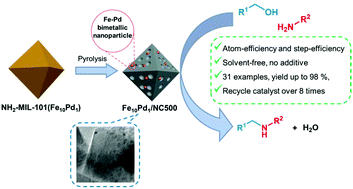Synthesis of an Fe–Pd bimetallic catalyst for N-alkylation of amines with alcohols via a hydrogen auto-transfer methodology†
Abstract
Hydrogen auto-transfer (HAT) or borrowing hydrogen (BH) methodology which combines dehydrogenation, intermediate reaction and hydrogenation, is recognized as an excellent strategy for one-pot synthesis from an economic and environmental point of view. Although much effort has been made on the development of catalysts for HAT reactions, harsh conditions, external base or large amounts of noble metals are still required in most reported catalysis systems, and thus the exploration of a highly efficient and recyclable heterogeneous catalyst remains meaningful. In this work, a novel bimetallic catalyst, Fe10Pd1/NC500 derived from bimetallic MOF NH2-MIL-101(Fe10Pd1), has been prepared, and the catalyst exhibits superior catalytic performance for the N-alkylation of amines with alcohols via a hydrogen auto-transfer methodology. High yields of the desired products were achieved at 120 °C with an alcohol/amine molar ratio of 2 : 1 and required no external additive or solvent. A distinct enhancement in catalytic performance is observed when compared with monometallic catalysts, which can be ascribed to the “synergistic effects” inside the bimetallic alloys. The N-doped carbon support has been revealed to provide the necessary basicity which avoids the requirement of an external base. Moreover, a wide substrate range and remarkable reusability have been shown by Fe10Pd1/NC500, and this work highlights new possibilities for bimetallic catalysts applied in sustainable chemistry.

- This article is part of the themed collection: 2021 Green Chemistry Hot Articles


 Please wait while we load your content...
Please wait while we load your content...